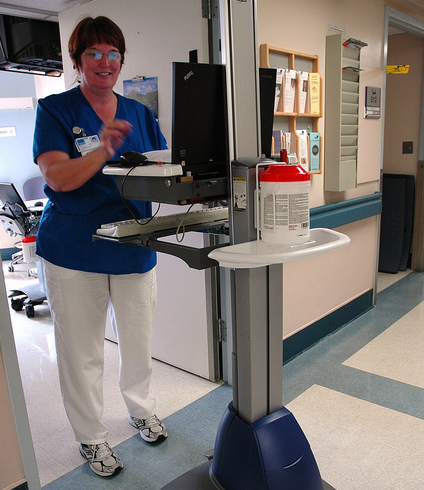Keep Tabs on Your Health Care Using Electronic Medical Records

The use of computers has revolutionized health care. As with other businesses, paper files are playing a smaller role, and online access has become a must.
When you visit your doctor these days, you most likely see him or her using a laptop or handheld device, instead of a pad and pen, to make notes on your status, write scripts, and check your records. This information is fed into your electronic health record (EHR) for secure storage and retrieval (for more detail, see our earlier post on Understanding Electronic Health Records).
There are many benefits to electronic health records. They can save your physicians from duplicating efforts and give them more time to do the important work of caring for your health. Paper is an inefficient way to store medical information, and more costly to support and share, as compared to digitized medical information.
You have probably been asked to sign a release form so Hixny or another local health information exchange can make your medical records available for other providers who care for you.
Are you starting to think that maybe you should have electronic access to that information, too? If you have not already, consider signing up for a patient portal (if offered by your doctor’s office). This is a secure website that gives you convenient 24-hour access to personal health information. Log in with a secure username and password to view information about your health care. It is a simple and efficient way to keep the lines of communication open with your care team.
How to Use a Patient Portal
Contact your primary care provider’s office to ask whether a patient portal is available to you, or inquire about it at your next medical appointment. If it is an option, you may be given a temporary password and/or advised how to log in to view your records.
Using the portal will make it easier to exchange information with your doctor. Tasks that a portal would typically allow you to perform include:
- Viewing your personal health record
- Getting lab results
- Making appointments
- Ordering prescription refills
- Leaving messages for your doctor
Take advantage of your patient portal to improve the patient-provider partnership. This is a particularly valuable opportunity if you are managing a chronic disease such as diabetes, high blood pressure, asthma, or congestive heart failure.
A Kaiser Permanente study found that patients with diabetes who emailed their doctors received better care compared with those who didn’t. Just being able to access your health data whenever you want can help you remember details about your health or improve understanding.
Having that information at your fingertips will enable you to read it, digest it, and refer back to it as needed. And if you spot any errors or have questions about your record, you will be able to alert your doctor.
If you have lab tests done, you can expect to see the results online within just a few days, instead of waiting for your doctor to call or send you information in the mail.
Obviously, this is not the best way to reach your medical team if you have an urgent concern. Online interactions will never replace face-to-face visits. And a good old-fashioned telephone call is still a great way to request a same-day appointment if you wish to be seen right away.
But Are Online Medical Records Secure?
Many patients have concerns about the security of electronic health records. It may reassure you to know that patient portals use firewalls, encryption software, antivirus software, and log-on requirements such as passwords to keep systems secure.
That doesn’t mean they are foolproof, and data breaches have been known to occur. Of course, paper records have been subject to inappropriate releases, too.
Speak with your doctor’s office staff about how their portal works. If you are not comfortable with the system, don’t use it. If you do decide to use it, here are a few steps that you can take on your end to protect your own privacy:
- Use a computer that is private and accessible only to you or people you trust (like your immediate family members). Be sure it has an anti-malware program installed.
- The email address you use to communicate with your doctor should be private, too. Don’t use a work email address associated with and owned by your company, or one that you share with anyone else.
- Don’t access your medical record via a public wireless connection, such as in a café or hotel. These connections are less secure than your private network at home.
- Password-protect all electronic devices and accounts, including your computer, smart phone, tablet, and email.
- Store your health data securely. If you download your record, place it on a thumb drive and store it in a safe or anyplace else where you would keep sensitive information.
 The Daily Dose
The Daily Dose
Peter Martone
Could you provide me with a email address for Dr.Nita Parikh of internal medicine.
Natalia Burkart
We recommend calling your provider’s office for this information. Or, if your office uses an app to communicate with patients, you could send a secure message to your provider that way.